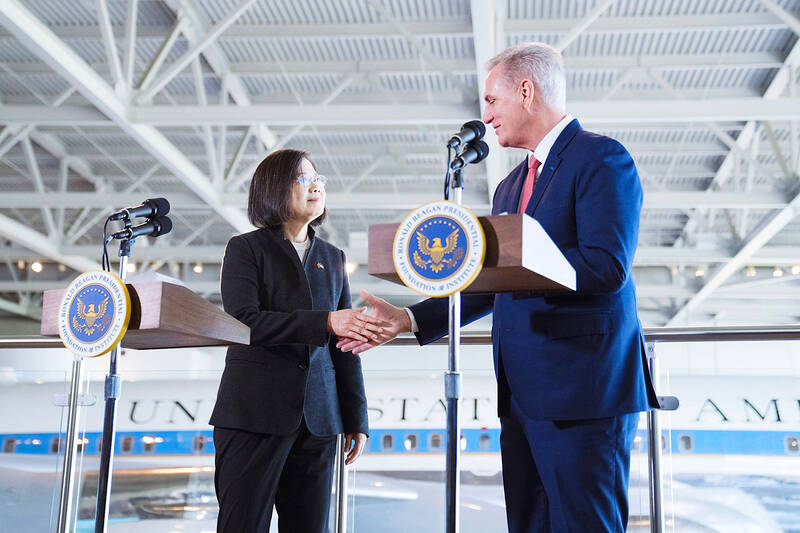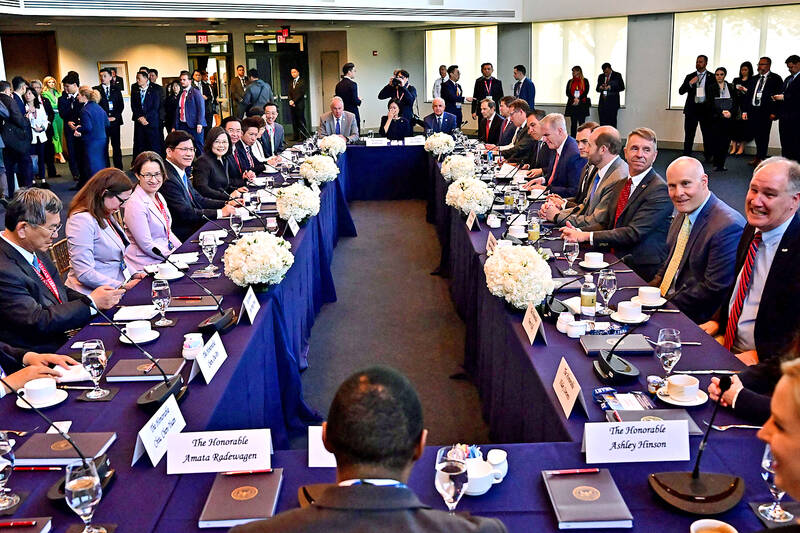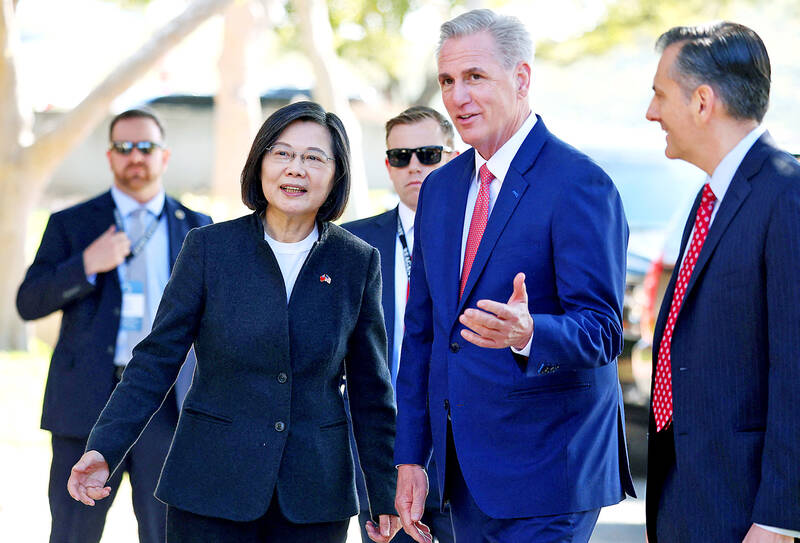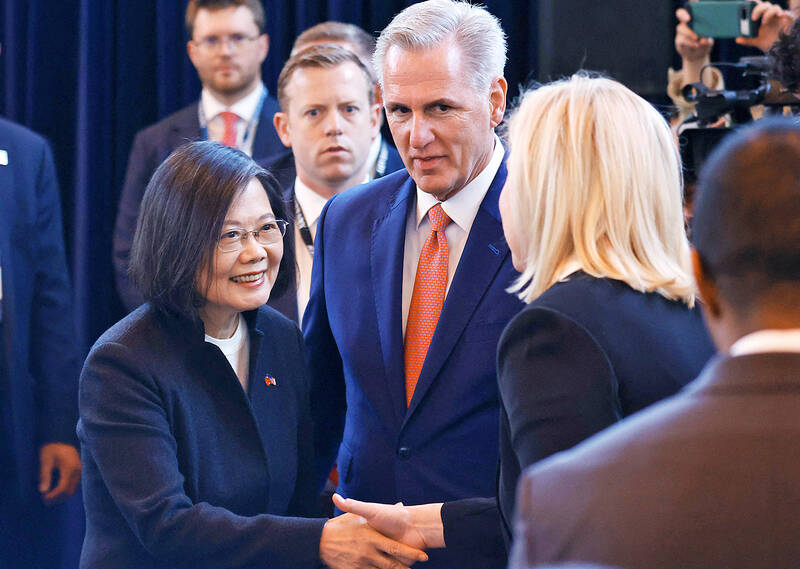President Tsai Ing-wen (蔡英文) and US House of Representatives Speaker Kevin McCarthy reaffirmed the strong partnership between Taiwan and the US, and their commitment to safeguarding regional stability, following their meeting in California on Wednesday.
“I believe our bond is stronger now than at any time or point in my lifetime,” McCarthy told a joint news conference with Tsai following a two-hour closed-door meeting at the Ronald Reagan Presidential Library in Simi Valley.
The meeting was also attended by a bipartisan group of US lawmakers. It was the first meeting between a Taiwanese president and a US House speaker on US soil, and the third since Washington severed formal diplomatic ties with Taipei in 1979.

Photo: Bloomberg
“Taiwan is a successful democracy, a thriving economy, and a global leader in health and science. And whether it’s our deep commercial ties, strong people-to-people relationships, or shared values, our cooperation with the people of Taiwan continue to expand through dialogue and exchange,” McCarthy said.
He said the friendship between Taiwanese and Americans “is a matter of profound importance to the free world,” and is critical to maintaining economic freedom, peace and regional stability.
Touting Wednesday’s meeting as a “bipartisan meeting of Republicans and Democrats united together,” McCarthy said the US would honor its obligations and commitment to its shared values with Taiwan.

Photo: AFP
Tsai told the news conference that the presence of bipartisan lawmakers at the meeting and their unwavering support reassures Taiwanese that “we are not isolated, and we are not alone.”
Taiwan’s peace and democracy, which it has worked hard to build and maintain, are facing “unprecedented challenges,” Tsai said.
“We once again find ourselves in a world where democracy is under threat. And the urgency of keeping the beacon of freedom shining cannot be understated,” she said.

Photo: AFP
Tsai said that during her meeting with US congressional leaders, she reiterated Taiwan’s commitment to defending the “peaceful status quo” and highlighted the belief championed by former US president Ronald Reagan that “to preserve peace, we must be strong.”
“We are stronger when we are together,” she said.
She thanked US lawmakers for proposing initiatives to enhance Taiwan’s self-defense capabilities, foster robust trade and economic ties between Taiwan and the US, and support the nation’s meaningful participation in the international community.

Photo: AFP
Tsai also paid tribute to Reagan, who she said played a crucial role in protecting and fortifying Taiwan-US relations at a time of changing diplomatic realities.
The Reagan administration’s “six assurances,” passed in 1982, as well as the landmark Taiwan Relations Act, laid the foundation for a strong and unique partnership that has lasted for more than four decades, during which Taiwan enjoyed peace, prosperity and democracy, Tsai said.
Wednesday’s meeting took place eight months after McCarthy’s predecessor, then-US House speaker Nancy Pelosi, visited Taipei in August last year and met with Tsai at the Presidential Office.
Pelosi’s visit was the first by a sitting US House speaker since a trip by Newt Gingrich in 1997. It prompted China to launch week-long large-scale military drills around Taiwan, and suspend the imports of dozens of Taiwanese agricultural and food products.
Beijing has raised objections to the meeting between Tsai and McCarthy.
Chinese Ministry of Foreign Affairs spokeswoman Mao Ning (毛寧) earlier this week told a news briefing that Beijing would “take resolute measures” to protect its national interests should the two meet.

CHAOS: Iranians took to the streets playing celebratory music after reports of Khamenei’s death on Saturday, while mourners also gathered in Tehran yesterday Iranian Supreme Leader Ayatollah Ali Khamenei was killed in a major attack on Iran launched by Israel and the US, throwing the future of the Islamic republic into doubt and raising the risk of regional instability. Iranian state television and the state-run IRNA news agency announced the 86-year-old’s death early yesterday. US President Donald Trump said it gave Iranians their “greatest chance” to “take back” their country. The announcements came after a joint US and Israeli aerial bombardment that targeted Iranian military and governmental sites. Trump said the “heavy and pinpoint bombing” would continue through the week or as long

TRUST: The KMT said it respected the US’ timing and considerations, and hoped it would continue to honor its commitments to helping Taiwan bolster its defenses and deterrence US President Donald Trump is delaying a multibillion-dollar arms sale to Taiwan to ensure his visit to Beijing is successful, a New York Times report said. The weapons sales package has stalled in the US Department of State, the report said, citing US officials it did not identify. The White House has told agencies not to push forward ahead of Trump’s meeting with Chinese President Xi Jinping (習近平), it said. The two last month held a phone call to discuss trade and geopolitical flashpoints ahead of the summit. Xi raised the Taiwan issue and urged the US to handle arms sales to

A magnitude 5.6 earthquake struck off the coast of Yilan County at 12:37pm today, with clear shaking felt across much of northern Taiwan. There were no immediate reports of damage. The epicenter of the quake was 16.9km east-southeast of Yilan County Hall offshore at a depth of 66.8km, Central Weather Administration (CWA) data showed. The maximum intensity registered at a 4 in Yilan County’s Nanao Township (南澳) on Taiwan’s seven-tier scale. Other parts of Yilan, as well as certain areas of Hualien County, Taipei, New Taipei City, Taoyuan, Hsinchu County, Taichung and Miaoli County, recorded intensities of 3. Residents of Yilan County and Taipei received

Taiwan has secured another breakthrough in fruit exports, with jujubes, dragon fruit and lychees approved for shipment to the EU, the Ministry of Agriculture said yesterday. The Animal and Plant Health Inspection Agency on Thursday received formal notification of the approval from the EU, the ministry said, adding that the decision was expected to expand Taiwanese fruit producers’ access to high-end European markets. Taiwan exported 126 tonnes of lychees last year, valued at US$1.48 million, with Japan accounting for 102 tonnes. Other export destinations included New Zealand, Hong Kong, the US and Australia, ministry data showed. Jujube exports totaled 103 tonnes, valued at